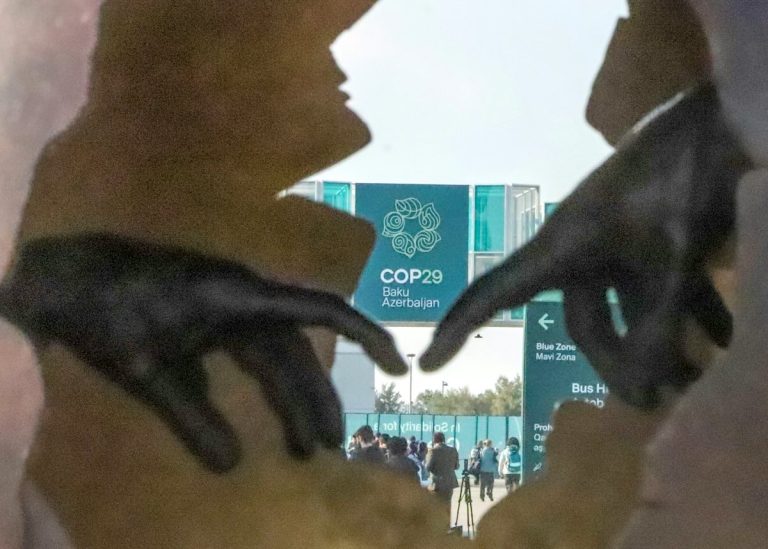
As COP29, the United Nations' annual climate change summit, takes place in Baku, Azerbaijan, Canadians may notice that their government is not publicizing their participation as widely as in previous years. [emphasis, links added]
At the 2015 Paris climate summit, Prime Minister Justin Trudeau was in attendance on the first day, promising delegates that Canada “will take a new leadership role internationally.”
Carbon pricing is now one of the Liberal government's least popular issues, This is the third consecutive year that Trudeau will not attend the summit in person, which will be held from November 11 to 22.
Environment Minister Steven Guilbeault appears to pledge more than $1 billion in climate-related foreign aidCanada built an entire pavilion at the conference, hosting workshops ranging from equitable responses to climate disasters to inspiring change through the eyes of children around the world.
But Baku may lack the glamor of previous UN climate change conferences.
As detailed below, Canada will rub shoulders with the Taliban, Putin loyalists — and all in one of the most oil-dense cities on Earth.
Taliban are there
Afghanistan's Taliban rulers have not been granted a seat in the United Nations General Assembly, and only a handful of countries have established any form of formal diplomatic relations with the government, which officially calls itself the Islamic Emirate of Afghanistan.
Still, they can attend the United Nations climate change conference.
weekend, Reuters confirms Taliban National Environmental Protection Agency representatives will travel to Bakumaking this the most prestigious international summit attended by a rogue theocracy.
So does Russia (they are one of the largest delegations)
Azerbaijan was once part of the Soviet Union and still maintains friendly relations with its former rulers.
Just in August, Russian President Putin paid a state visit to Baku and signed an “action plan to strengthen bilateral cooperation.”
Internal emails obtained by Reuters also show, Russia played an important role in hosting this year's meeting with Azerbaijan and EU member Bulgaria.
All this could be the reason Russia is more inclined than most countries to attend the climate change conference, with a delegation of 900 people.
Although they represent Countries whose economies rely heavily on oil and Almost no climate policy of any substance has been adoptedthe Russian news agency TASS did say The Russian delegation will achieve “carbon neutrality” for the first time.
For Canadians attending the conference, this means they will be sharing cafeteria lines and restrooms with others. Ottawa is helping to massacre a country's soldiers.
At last count, Canada has provided $4.5 billion in military aid to Ukraine to fight the Russian invasion.
The entire event takes place in the historic center of oil production
Some of the most prominent UN climate change conferences have been held in cities known for their low environmental footprint, such as Copenhagen, Paris or Kyoto.
Over the past two meetings, this trend has clearly ended in favor of being held in some of the world's most prominent oil nations.
Last year it was Dubai, a city almost entirely funded, built and sustained by fossil fuels. This year, the name of the place is actually synonymous with oil.

Baku is the world's first major oil production center outside the United States. The main job in Baku is still pumping oil.
Oil production accounts for about half of Azerbaijan's GDP, while Canada's only accounts for about 3%.
The lights at COP29 are maintained by an energy grid fueled almost entirely by fossil fuels.
According to the latest analysis from the International Energy Agency, Only 6% of Azerbaijan’s electricity comes from renewable energy sources (In Canada, this proportion is over 70%).
[Roughly 68% of Canada’s electricity comes from renewable sources, with hydropower being the largest contributor at about 60%. Other renewables, like wind and solar, account for around 8%. —CCD editor]
The main goal of COP29 is to persuade rich countries to provide trillions of dollars to poor countries
Press coverage of UN climate change conferences often ends up focusing on one core number. For example, during the Paris climate negotiations, This goal is summarized as limiting temperature rise to 1.5 degrees above pre-industrial levels.
This time, The main number is a monetary one: $1 trillion. This is one of the proposed targets of the new Collective Quantified Targets (NCQG); essentially a huge amount of money from rich countries to fund the efforts of poor countries to mitigate climate change.
The World Economic Forum, for example, has rallied around a $1 trillion goal, suggesting that new taxes and pollution taxes could fund it.

The number of representatives increased significantly compared with previous years
Only a few years ago, Canada regularly sent one of the largest delegations to United Nations climate change conferences.
In 2015, Canada sent 283 representatives to Paris; the team was twice the size of the U.S. team and three times the size of the British team.
This time, the size of the Canadian delegation didn't even crack the top 20. But that's not to say Canada is sending fewer personnel. quite, Compared with previous years, the number of delegations sent by other countries around the world has increased significantly.
Canada will send about 370 people to Baku. Compare that to Carbon Brief's analysis, which found Brazil registered 1,914 delegates, Turkey registered 1,862 delegates, and even African countries Chad and Nigeria surpassed Canada in attendance (387 and 637 respectively).
In total, an estimated 65,000 people came to Baku. This is almost double the 36,000 people who attended the Paris conference in 2015.
On the one hand, activist groups say the delegate swell is partly due to the growing number of oil industry lobbyists at the conference; 2,456 this year compared with 636 last year, according to Kick Big Polluters Out.
Popular photo on Unsplash by Matthew TenBruggencate
Read more on MSN
